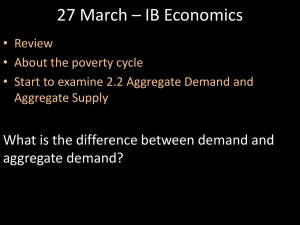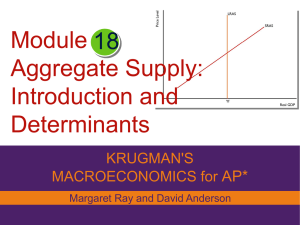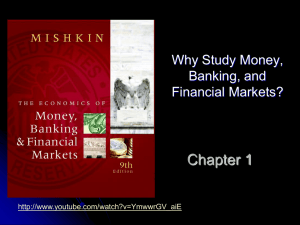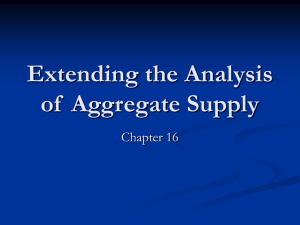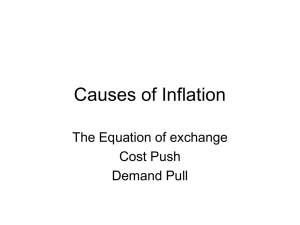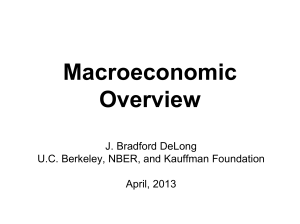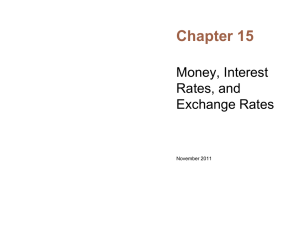AP Macroeconomic Practice Exam 2014
advertisement
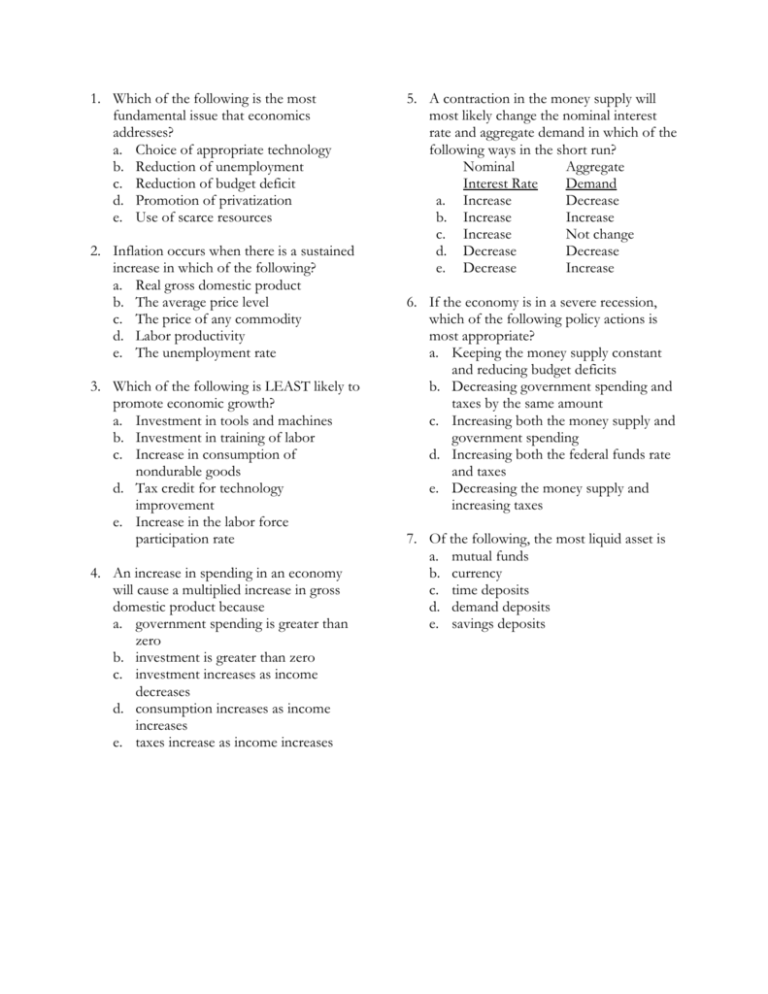
1. Which of the following is the most fundamental issue that economics addresses? a. Choice of appropriate technology b. Reduction of unemployment c. Reduction of budget deficit d. Promotion of privatization e. Use of scarce resources 2. Inflation occurs when there is a sustained increase in which of the following? a. Real gross domestic product b. The average price level c. The price of any commodity d. Labor productivity e. The unemployment rate 3. Which of the following is LEAST likely to promote economic growth? a. Investment in tools and machines b. Investment in training of labor c. Increase in consumption of nondurable goods d. Tax credit for technology improvement e. Increase in the labor force participation rate 4. An increase in spending in an economy will cause a multiplied increase in gross domestic product because a. government spending is greater than zero b. investment is greater than zero c. investment increases as income decreases d. consumption increases as income increases e. taxes increase as income increases 5. A contraction in the money supply will most likely change the nominal interest rate and aggregate demand in which of the following ways in the short run? Nominal Aggregate Interest Rate Demand a. Increase Decrease b. Increase Increase c. Increase Not change d. Decrease Decrease e. Decrease Increase 6. If the economy is in a severe recession, which of the following policy actions is most appropriate? a. Keeping the money supply constant and reducing budget deficits b. Decreasing government spending and taxes by the same amount c. Increasing both the money supply and government spending d. Increasing both the federal funds rate and taxes e. Decreasing the money supply and increasing taxes 7. Of the following, the most liquid asset is a. mutual funds b. currency c. time deposits d. demand deposits e. savings deposits Questions 8-9 refer to the income and consumption data presented in the table below. Assume a closed economy with no government and a marginal propensity to consume of 0.80. Disposable Income Consumption $620 $624 $640 $640 $660 $656 $680 $672 $700 $688 $720 $704 $740 $720 $760 $736 8. Dissaving occurs when disposable income is a. $620 b. $640 c. $660 d. $700 e. $1,000 9. The marginal propensity to save for this economy is a. 4.0 b. 1.0 c. 0.8 d. 0.2 e. 0 10. An increase in government spending will affect the demand for money and nominal interest rates in which of the following ways? Demand for Nominal Money Interest Rates a. Increase Increase b. Increase Decrease c. Increase Indeterminate d. Decrease Increase e. Decrease Decrease 11. Which of the following policies, if appropriately sized, would provide expansion during a recession with the smallest change in interest rates? a. An open-market purchase of government securities by the central bank and a decrease in the federal funds rate b. An open-market sale of government securities by the central bank and an increase in the federal funds rate c. A decrease in taxes and an openmarket purchase of government securities by the central bank d. An increase in government spending and an open-market sale of government securities by the central bank e. An increase in taxes and an increase in the federal funds rate 12. In the circular flow diagram of a market economy, which of the following supplies the factors of production? a. The business sector b. The government c. The household sector d. Financial sector e. The foreign sector 13. If the velocity of money is constant and the aggregate supply curve is vertical, a doubling of the money supply would most likely result in a doubling of a. the unemployment rate b. real output c. the price level d. nominal interest rates e. real interest rates 14. An increase in which of the following would most likely result in an increase in aggregate supply? a. The price level b. Aggregate demand c. Unemployment compensation d. Labor-force participation rate e. The minimum wage 15. The main benefit of free trade between two countries is that a. income distribution in each country will become more equitable b. employment in each country will increase c. migration from one country to the other will increase d. each country can consume beyond its constraints of resources and productivity e. each country will become more selfsufficient 16. Assume that the public holds part of its money in cash and the rest in checking accounts. If the central bank lowers the reserve requirement from 16 percent to 8 percent, the money supply will a. decrease by more than half b. decrease by half c. decrease by less than half d. exactly double e. increase by less than double 17. The graph above shows two aggregate demand curves, AD1 and AD2, and an aggregate supply curve, AS. The shift in the aggregate demand curve from AD1 to AD2 could be caused by a. a decrease in taxes b. a decrease in the money supply c. an increase in government spending d. an increase in consumption spending e. an increase in the price level 18. An increase in the international value of the United States dollar will most likely benefit a. domestic producers of premium wines sold to people in other countries b. currency traders holding large quantities of yen c. German citizens vacationing in the United States d. Canadian citizens expecting to purchase real estate in the United States e. retired United States citizens living overseas on their social security checks 19. Which of the following will cause an increase in aggregate demand? a. An increase in the price level b. A decrease in income taxes c. An increase in the demand for money d. A decrease in the supply of money e. A decrease in government transfer payments 20. If wages are sticky, which of the following policies will be the most effective in raising real gross domestic product to the full-employment level? a. Doing nothing, since there are automatic stabilizers b. The sale of bonds by the Federal Reserve c. An increase in the income tax d. An increase in government spending e. An increase in the discount rate 21. Suppose that Country A is experiencing high inflation relative to Country B, which is enjoying steady growth with a stable price level. Which of the following would occur in the foreign exchange market? a. An increase in the demand for Country A’s currency b. An increase in the supply of Country B’s currency c. A decrease in the supply of Country A’s currency d. A decrease in the demand for Country B’s currency e. A depreciation of Country A’s currency 22. Which of the following will most likely cause an increase in real output in the long run? a. A decrease in the labor force participation rate b. An increase in the velocity of money c. An open-market sale of government bonds by the central bank d. An increase in immigration from abroad e. An increase in the price level 23. Potential gross domestic product will decrease under which of the following conditions? a. The growth rate of the population increases more rapidly than the growth rate of gross domestic product. b. Nominal gross domestic product increases more than real gross domestic product. c. The natural rate of unemployment decreases. d. The country’s annual depreciation is greater than its annual gross investment. e. The monetary authorities adopt an easy monetary policy. 24. Which of the following actions by the Federal Reserve of the United States increases the money supply? a. Buying government bonds on the open market b. Selling government bonds on the open market c. Increasing the reserve requirement d. Increasing the discount rate e. Increasing the federal funds rate 25. If the production technology of a good improves and at the same time the number of consumers willing and able to buy the good in the market increases, which of the following will definitely occur? a. Equilibrium price will increase. b. Equilibrium price will decrease. c. Equilibrium quantity will increase. d. Equilibrium quantity will decrease. e. Equilibrium quantity will remain the same. 26. An increase in which of the following will most likely increase productivity? a. Population growth rate b. Aggregate demand c. Capital stock d. Consumption e. Employment 27. The short-run aggregate supply curve would be vertical if a. nominal wages adjust immediately to changes in the price level b. nominal wages adjust slowly when there is unemployment c. both nominal wages and prices adjust slowly to changes in aggregate demand d. the spending multiplier is very low e. investment demand is very responsive to changes in interest rates 28. Increases in the real per capita income of a country are most closely associated with increases in which of the following? a. The labor force b. The price level c. The money supply d. Productivity e. Tax rates 29. The consumer price index (CPI) is criticized for a. overstating the true burden of inflation because it does not recognize consumers’ ability to substitute goods and services as prices change b. overstating the true burden of inflation because it recognizes consumers’ ability to substitute goods and services as prices change c. understating the true burden of inflation because it does not recognize consumers’ ability to substitute goods and services as prices change d. understating the true burden of inflation because it recognizes consumers’ ability to substitute goods and services as prices change e. overstating the true burden of inflation because it reflects the prices of both intermediate goods and final goods 30. A rightward shift of the short-run Phillips curve is most likely due to a. an increase in aggregate demand b. a decrease in aggregate demand c. a decrease in the expected rate of inflation d. an increase in the expected rate of inflation e. an increase in aggregate supply 31. If the marginal propensity to consume is 0.75, then a $100 increase in investment will result in a maximum increase in equilibrium real gross domestic product of a. $40.00 b. $100.00 c. $133.33 d. $400.00 e. $500.00 32. Frictional unemployment occurs when which of the following happens? a. A worker is replaced by robots on factory assembly lines. b. A worker voluntarily quits a job to search for a better one. c. A worker is laid off because of a downturn in economic activity. d. A worker undergoes on-the-job training. e. A worker switches from working fulltime to part-time. 35. If a contractionary fiscal policy is followed by an expansionary monetary policy, nominal interest rate and employment would most likely be affected in which of the following ways in the short run? Nominal Interest Rate Employment a. Increase Increase b. Increase Decrease c. Decrease Decrease d. Decrease Indeterminate e. Indeterminate Decrease 33. On the graph above, stagflation will be caused by a a. leftward shift in the short-run aggregate supply curve only b. rightward shift in the short-run aggregate supply curve only c. leftward shift in the aggregate demand curve only d. rightward shift in the aggregate demand curve only e. rightward shift in both the short-run aggregate supply and aggregate demand curves 34. As a component of aggregate demand, investment refers to the a. purchase of raw land for later resale b. purchase of stocks and bonds c. purchase of new equipment and additional inventories d. difference between people’s income and spending e. dividends paid out to shareholders 36. Assume that the aggregate supply curve is upward sloping. If both aggregate supply and aggregate demand increase, what will happen to the equilibrium output and price level? Output Price Level a. Decrease Decrease b. Decrease Increase c. Indeterminate Increase d. Increase Indeterminate e. Increase Increase 37. Which of the following will lead to a depreciation of a nation’s currency? a. Lower inflation in the nation than in the rest of the world b. Higher required reserve ratio in the nation than in the rest of the world c. Decreased real interest rates in the nation compared with the rest of the world d. Increased demand for the nation’ s currency e. Decreased supply of the nation’ s currency 38. Country A’s growth rate in per capita real gross domestic product (GDP) has been consistently higher than that of Country B. Which of the following factors can account for these differences in the per capita GDP growth rates? a. Country B’s government gives more investment tax credits. b. The labor force of Country A is becoming more skilled than the labor force of Country B. c. The natural rate of unemployment is higher in Country A. d. Country A’s central bank is less effective at controlling the inflation rate. e. Although the populations of Countries A and B are the same, Country A has twice as many people who are retired. 39. According to the graph above and starting with equilibrium point R, which of the following shifts identifies the short-run and the long-run impact of a demand-pull inflation? Short Run Long Run a. R to N M to N b. R to M R to N c. R to Q Q to N d. R to M R to Q e. R to N N to Q 40. If the central bank raises the required reserve ratio, the money multiplier and the money supply will change in which of the following ways? Money Money Multiplier Supply a. Increase Increase b. Increase Decrease c. Increase No change d. Decrease No change e. Decrease Decrease 41. In the short run, government deficit spending will most likely a. raise the unemployment rate b. lower the inflation rate c. raise nominal interest rates d. lower private savings e. raise net exports 42. An increase in the price level will most likely cause which of the following? a. A leftward shift of the aggregate demand curve b. An increase in the demand for money c. An increase in the real interest rate d. A decrease in the nominal interest rate e. An increase in the supply of money 43. The purchase of United States government bonds by Japanese investors will be included in Japan’s a. current account b. financial account (formerly called capital account) c. trade deficit d. foreign direct investment e. imports 44. Assume that the marginal propensity to consume out of disposable income is 0.8 and that the government taxes all income at a constant rate of 30 percent. If gross income increases by $100, consumption will initially increase by a. $44 b. $56 c. $70 d. $80 e. $100 45. Public policy that generates an unexpected increase in consumer prices will inflict short-run costs on all of the following EXCEPT a. Borrowers b. workers with fixed incomes c. savers holding non-interest-bearing money d. taxpayers shifted into higher tax brackets e. people whose incomes are not adjusted for inflation 46. If aggregate demand is growing faster than long-run aggregate supply, the Federal Reserve is most likely to a. sell securities on the open market b. increase bond prices c. increase income taxes d. decrease the discount rate e. decrease the required reserve ratio 47. Assume that Country A exports one bushel of wheat in exchange for 2.5 bushels of corn from Country B. If the terms of trade are beneficial to both countries, which of the following must be true? a. Country A has an absolute advantage in the production of wheat. b. The cost of producing a bushel of wheat in Country A is less than 2.5 bushels of corn. c. The cost of producing a bushel of wheat in Country A is greater than 2.5 bushels of corn. d. Country A is producing inside its current production possibilities curve. e. Country A needs to use more resources to produce wheat than to produce corn. 48. Which of the following is true of the opportunity cost of holding cash? a. It is zero. b. It is represented by the value of the dollar. c. It is equal to the price level. d. It decreases as the price level rises. e. It increases as the interest rate rises. 49. The natural rate of unemployment can be defined as the a. unemployment rate consistent with accelerating inflation b. unemployment rate of the least-skilled workers c. economy’s long-run equilibrium rate of unemployment d. labor force participation rate plus the unemployment rate e. labor force participation rate minus the unemployment rate 50. In the long run, an increase in aggregate demand due to an expansion in the money supply will increase a. price level and real output b. nominal output and real output c. nominal output but not the price level d. nominal output and the price level e. real output but not the price level 51. Rational expectations theory suggests that people a. do not estimate future inflation rates because it is impossible to do so b. believe that current inflation should be the same as last year’s c. assume that current inflation will be the same for next year d. use all available information in forming their expectations about future inflation e. assume that current inflation will be equal to the average inflation of the past decade 52. Following a decrease in the real interest rate, there is an increase in financial capital outflows from Country A. The increase in capital outflows will most likely have which of the following effects on Country A’s net exports and aggregate demand? Net Exports Aggregate Demand a. Decrease Decrease b. Decrease No change c. Increase Increase d. Increase Decrease e. Increase No change 53. If the required reserve ratio is 10 percent, actual reserves are $10 million, and currency in circulation is equal to $20 million, M1 will at most be equal to a. $20 million b. $30 million c. $90 million d. $120 million e. $150 million 54. For an economy that is operating inside its production possibilities curve, which of the following is true? a. It can increase the production of both goods. b. Its population is growing faster than the economy’s ability to increase production. c. It is using all available resources efficiently. d. It cannot move to a point on the production possibilities curve with available technology. e. It lacks the resources to increase production beyond its current output. 55. If unemployed workers become discouraged and give up trying to find work, the number of workers employed and the unemployment rate would change in which of the following ways? Number of Workers Unemployment Employed Rate a. Decrease Decrease b. Decrease Increase c. Decrease No change d. No change Decrease e. No change Increase 56. Which of the following is true of the Phillips curve? a. It is vertical in the short run, but is upward sloping in the long run. b. It is upward sloping in the short run, but is downward sloping in the long run. c. It is downward sloping in the short run, but is vertical in the long run. d. It shows trade-offs between unemployment and inflation in the long run but not in the short run. e. It is upward sloping both in the short run and in the long run if inflation is anticipated correctly. 59. If the value of the United States dollar increases on the foreign exchange market, which of the following is most likely to occur in the short run? a. Aggregate demand will decrease. b. Aggregate demand will increase. c. Aggregate supply will decrease. d. Both aggregate demand and aggregate supply will decrease. e. Both aggregate demand and aggregate supply will increase. 57. The diagram above shows three production possibilities curves (PPCs). If the current PPC is PPC1, which of the following changes indicates a recession? a. Movement from point X to point Y b. Movement from point Y to point X c. Movement from point Y to point Z d. Shift from PPC1 to PPC0 e. Movement from point Z to point X 58. If wages and prices are perfectly flexible and inflation is correctly anticipated, then an expansionary monetary policy will affect the real output and price level in which of the following ways? Real Output Price Level a. Increase Increase b. Increase Decrease c. Increase Not change d. Not change Increase e. Not change Not change 60. Assume that the reserve requirement for demand deposits is 20 percent, that banks hold no excess reserves, and that the public holds no currency. If the central bank sells $10,000 worth of government securities to commercial banks, the total money supply will a. increase by $10,000 b. increase by $50,000 c. decrease by $10,000 d. decrease by $50,000 e. not change 1. 2. 3. 4. 5. 6. 7. 8. 9. 10. 11. 12. 13. 14. 15. 16. 17. 18. 19. 20. 21. 22. 23. 24. 25. 26. 27. 28. 29. 30. 31. 32. 33. 34. 35. 36. 37. 38. 39. 40. 41. 42. 43. 44. 45. 46. 47. 48. E B C D A C B A D A C C C D D E B E B D E D D A C C A D A D D B A C D D C B B E C B B B A A B E 49. 50. 51. 52. 53. 54. 55. 56. 57. 58. 59. 60. C D D C D A D C C D A D
